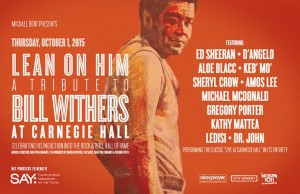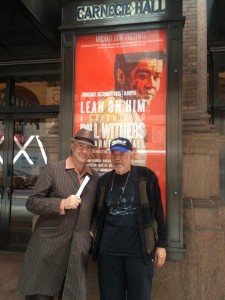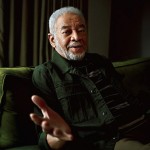Bill Withers tried to fit his life into the rough-and-tumble business of music. But in 1985 he decided that his life didn’t fit. The poet laureate of Slab Fork, West Virginia, vanished from the scene to live his own life. When he was inducted into the Rock & Roll Hall of Fame in April at age 76, he nearly stole the ceremony with a down-home homily about family, faith and work as its own reward. He took another rare turn in the spotlight last month at Carnegie Hall where many of his handpicked guests, including Ed Sheeran, Kathy Mattea, Keb’ Mo’, Dr. John, Branford Marsalis, Gregory Porter, Ledisi, Jonathan Butler, Aloe Blacc, Michael McDonald, Valerie Simpson, Kori Withers and Amos Lee, gathered to recreate his celebrated 1973 album, “Live at Carnegie Hall.” The occasion was certainly close to his heart. Withers, who stuttered as a child with asthma, announced from the stage that the benefit concert had raised $50,000 for SAY: The Stuttering Association For The Young. Leo Sacks, who was OffBeat’s Producer of the Year in 2014, conceived and co-produced the Carnegie Hall tribute. As the producer of the Grammy Award-winning “Bill Withers: The Complete Sussex & Columbia Albums,” he has been a first-hand witness to some of Withers’ trials and triumphs.
Sacks offered this appreciation to OffBeat.
Bill Withers brought masculinity and vulnerability to everyday emotions. With signature songs like “Lean On Me,” “Ain’t No Sunshine,” “Grandma’s Hands,” “Lovely Day” and “Use Me,” he created a singular brand of intimate, conversational art. He may have vanished but his music never went away.
Now, we may think that we know the measure of a man. But as Rogers and Hammerstein wrote in “Some Enchanted Evening”: “Fools give you reasons/Wise men never try.” The facts of Bill’s life will always feel like they were scripted in a writer’s room. His mother’s father was born into slavery in 1854. His parents were born in the 1890s. His father was a coal miner in Slab Fork, a tiny hamlet in Raleigh County, West Virginia. He had pride of place with his grandma as the youngest of six children. Never had a formal education. Spent nine years in the U.S. Navy. Worked in an airplane parts factory. Sold his car—in Southern California!—to finance his own recordings. Became an overnight success in his early ’30s only because flipped the A-side of his first single, “Harlem,” and played “Ain’t No Sunshine” on the B-side instead.
Over the course of nine albums—from 1971’s Just As I Am to 1985’s Watching You Watching Me—Bill braved seismic shifts in music: the advent of disco; synthesizers that replaced real people; stylistic demands from a newly created “urban” radio format; and ultimately the unforgiving pressure to write hits.
That he also tolerated a business studded with scoundrels and skullduggery came with the territory. But when his record company suggested that he cover “In The Ghetto,” the huge hit for Elvis Presley, Bill decided that “A&R” stood for “arrogance and redundancy.” The factory bell had sounded: it was quitting time. John Lennon would always be music’s most famous househusband who turned his back on the business. But William Harrison Withers would always be music’s most misunderstood.
When the new century began, I was afforded the once-in-a-lifetime opportunity to preserve his analog legacy in a digital world. The course of our conversation was like a changing season. Bill told me that he left music to start a family. That he did a lot of his own maturing in the process of parenting. That he waited until he was seasoned enough to become a full-time father. That he waited, just like his own parents did. “That’s what they deserved,” he said of his children, Todd and Kori. I hung on his every word. He was like a father figure and a favorite uncle. Wry and witty. Enigmatic and elliptical. A poet and a philosopher. A voice of experience. I listened closely to his favorite topic: “my old friend fear.”
We drove around Beverly Hills and Santa Monica but we might as well have been tooling along Route 54 in Slab Fork where Withers was born on the Fourth of July. Railroad tracks separated the races. But Bill intuitively understood a commonalty in people—that we all have needs, and we all need the same thing.
Buying property and fixing it up became his passion. He drove a beat-up van around Los Angeles and wandered around Home Depot. He told me about a counter person at a coffee shop who gave him a free donut when one day. “I was wearing my work clothes,” he said. “She must have felt sorry for me.” When our conversation turned to making music, I asked him whether he planned to record again. He looked at me with a flash of fire. Squarely in the eye. “What makes you think there’s any interest in what a man of my age has to say?” he said.
What would Bill say with his music today? I miss the songs that might speak to the dislocated and disenfranchised and resonate with our higher selves. Where is the anthem that might reverberate in our turbulent times? Mostly, I wonder what he might decide to reveal about himself.
 While he was being inducted into the Rock & Roll Hall of Fame, I had a dream of recreating his kinetic Live at Carnegie Hall. Recorded in October of 1973, America was reeling from Watergate, Vietnam and assassinated dreams. That night, a near-religious fervor rippled through Carnegie Hall as Bill performed one of the most enduring protest songs of modern times. “I Can’t Write Left-Handed” became a hymn of heartbreak for a one-armed Vietnam veteran trying to reason with the unreasonable.
While he was being inducted into the Rock & Roll Hall of Fame, I had a dream of recreating his kinetic Live at Carnegie Hall. Recorded in October of 1973, America was reeling from Watergate, Vietnam and assassinated dreams. That night, a near-religious fervor rippled through Carnegie Hall as Bill performed one of the most enduring protest songs of modern times. “I Can’t Write Left-Handed” became a hymn of heartbreak for a one-armed Vietnam veteran trying to reason with the unreasonable.
As the album was reimagined at Carnegie Hall last month, you could feel the fervor again of Sunday church with Grandma Withers shaking her tambourine. A beastly all-star band was assembled, featuring drummer Steve Jordan, bassist Willie Weeks, guitarist Felicia Collins, percussionist Bashiri Johnson and keyboardist Dave Delhomme. Directed by the wizardly Greg Phillinganes, they crisscrossed from the Delta to Chicago, stopped in Spain and Brazil, then navigated back to New Orleans.
Bill’s guests took their time with his timeless message: that the universe is infinitely wise, people are fundamentally good and most importantly, that faith trumps fear every time. Aloe Blacc left the audience breathless with a heart-rending version of “Hope She’ll Be Happier.” Gregory Porter’s reading of “World Keeps Going Round” was transfixing. Valerie Simpson let her feelings show on “Let Me Be The One You Need.” Anthony Hamilton put a preacher’s hurting on “Harlem.” Ledisi unleashed a defiant “Who Is He (And What Is He To You).” In a world that has lost its mind, Keb’ Mo’ made “I Can’t Write Left-Handed” sound like it was written yesterday. It might as well have been. Except that Bill doesn’t live in a rear-view mirror. He kept time of our times. But he created in his own time.
In his new memoir, Black Man In a White Coat: A Doctor’s Reflections on Race and Medicine, Damon Tweedy discussed the racism that he experienced as a psychiatrist at Duke University. I had lost sight of what it means for Bill to live every day as a man of color in two Americas, separate and unequal.
“Leo, I’ve been a black guy all my life,” Bill said as we walked in a light rain back to his hotel before the show. His gait was slow but steady. “That’s what 77-year-old black guys have: black guy experiences. When I was a mechanic in the Navy, there were people who wouldn’t fly the airplane because I worked on it.”
He kept a firm watch on the traffic in both directions along West 57th Street. “New York is no place for old people,” he said. “Or poor people.”
A few months ago, Bill told The New York Times that police in Hollywood Hills had asked him what he was doing parked in his own car, in his own neighborhood. I repeated this to Steve Jordan after the show. “Of course Bill was stopped!” he exclaimed. Jordan’s tricky accents and especially his big foot had just rattled the rafters. Now he was speaking simply as a black man.
“People think it doesn’t happen to famous black people,” he continued. “But that’s a disconnect in this country. Remember the argument in the pizza parlor in “Do The Right Thing?” That the guys on the wall aren’t black because they’re famous? The fact is, there isn’t one black man I know, not a single black man, who hasn’t been stopped in his car, at some time in his life, by the police. What happened to Bill just proves my point.”
Leo Sacks recently became a consultant to Sony Masterworks. His documentary about the New Orleans gospel sensation Raymond Myles is currently in production. Watch the preview at www.raymondmylesmovie.com





